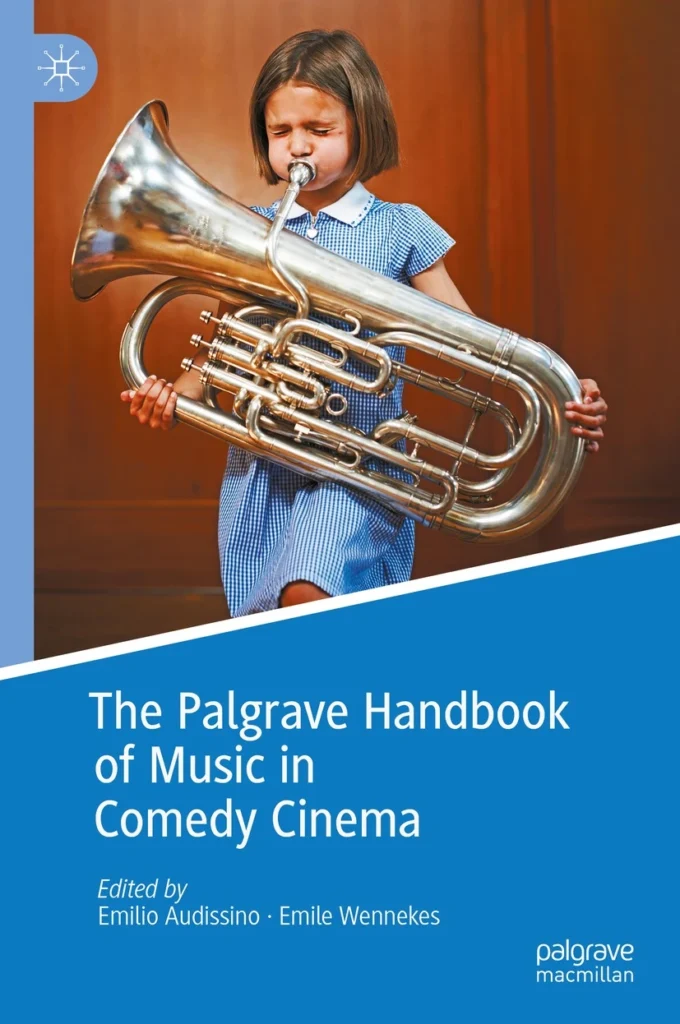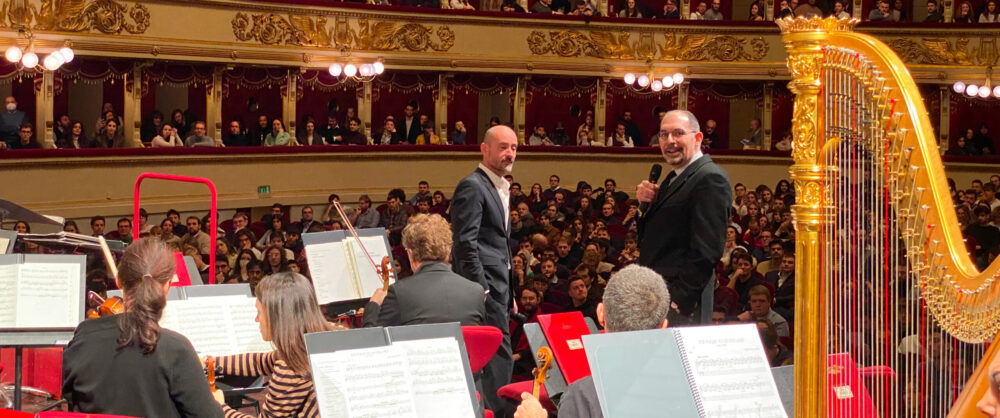Edited by Emilio Audissino and Emile Wennekes, 2023

This handbook tackles the understudied relationship between music and comedy cinema by analysing the nature, perception, and function of music from fresh perspectives. Its approach is not only multidisciplinary, but also interdisciplinary in its close examination of how music and other cinematic devices interact in the creation of comedy.
The volume addresses gender representation, national identities, stylistic strategies, and employs inputs from cultural studies, musicology, music theory, psychology, cognitivism, semiotics, formal and stylistic film analysis, and psychoanalysis.
It is organised in four sections: general introductions, theoretical investigations, music and comedy within national cinemas, and exemplary case studies of films or authors.
General Introductions
· From Dionysia to Hollywood: An Introduction to Comedy’s Long (and Bumpy) Road
Emilio Audissino (pp. 3-23)
· The Semiotics of Humour: Universal Humour Techniques in Comedy Writing
Arthur Asa Berger (pp. 25-42)
· Scoring Laughs: A Meditation on Music and Mirth
Emile Wennekes (pp. 43-61)
Theoretical Approaches and Analysis of Devices
· Audiovisual Parallelism and Counterpoint as Strategies of Musical Humour
Tom Schneller (pp. 65-84)
· The Audiovisual Architecture of Musical Pauses, Punchlines, and Jablines: Paddington’s Punctuation
Miguel Mera (pp. 85-101)
· The Self-Aware Soundtrack: Music as Metaleptic Device in Comedy Film
Marcel Bouvrie (pp. 103-117)
· ‘She’s a Babe … SCHWING!’: Feminine Spectacle and Parody in Comedy Film Scoring
Rebecca Fülöp (pp. 119-137)
· Pop-Rock Authenticity, Intertextuality, and Humour in the Films of Adam McKay and Will Ferrell
Nick Braae (pp. 139-153)
· ‘The Man for His Time and Place’: Identity, Musical Comedy, and the Compiled Soundtrack in The Big Lebowski
Catherine Haworth (pp. 155-171)
· Mozart in the Kitchen: Musical Reference and the Crisis of Action in Last Action Hero
Paul Labelle (pp. 173-187)
· ‘The Music Shouldn’t Acknowledge Any of the Jokes’. Audiovisual Incongruence and the Functions of Music in Contemporary Dark Comedy Films
David Ireland (pp. 189-205)
· Seriously Funny Music: The Use of ‘Serious’ Music for Comedic Effect
Matt Lawson (pp. 207-224)
· DJ, Interrupted: Delivering Punchlines with a Record Scratch
Andrew Simmons (pp. 225-238)
· On Being ‘In the Know’: When Classical Music Gets Played for Laughs
James Wierzbicki (pp. 239-252)
Music and Comedy Within National Cinemas
· Carry On Regardless: The Musical Humour of Eric Rogers
Mervyn Cooke (pp. 255-273)
· Musical-Comedic Stereotypes and Cinema. A Case Study of Irish-Themed Features, 1946–1952
John O’Flynn (pp. 275-292)
· The Paladin of Italian Comedy: Totò and Music
Roberto Calabretto (pp. 293-307)
· Mocking Sound: Das Kabinett Des Dr. Larifari (1930) as a Parody of Early German Sound Film
Ingeborg Zechner (pp. 309-326)
· ‘Hubert, You Are Sooo … French!’ Musical Pastiche and Parody in Michel Hazanavicius’ Espionage Comedy Films OSS 117 (2006, 2009)
Chloé Huvet, Marie-Hélène Chevrier (pp. 327-344)
· From Imperio to Lola: Mapping Comedy in the Tradition of Spanish Folkloric Musicals (1930–1960)
Laura Miranda (pp. 345-362)
· We Can Sing and Laugh like Children: Music as Comedy in the Film Musicals of Grigorij Aleksandrov and Isaak Dunaevskij
Peter Kupfer (pp. 363-378)
· Playing with Borders: Film Music and Social Criticism in Swedish Comedies by Hasse and Tage
Ann Kristin Wallengren (pp. 379-395)
· Harassing Hogwash Scored with Happy Hardcore: The Ruthless Humor of the Dutch New Kids Films
Emile Wennekes (pp. 397-413)
· On and Beyond Mickey-Mousing: Revisiting Yuan Muzhi’s Scenes of City Life (1935)
Jingyi Zhang (pp. 415-431)
· Overview of Music in Nollywood Comedy Cinema
Emaeyak Peter Sylvanus (pp. 433-448)
· Comedy and Parody in the Songs of the Hindi Cinema
Gregory D. Booth (pp. 449-464)
· Parody, Comedy, Subversion: Music in Japanese Comedy Cinema
Alexander Binns (pp. 465-480)
· Music for Tricksters and Music as Trickster in the Classical Hollywood Score
Nathan Platte (pp. 481-496)
Composers, Styles, and Corpus Studies
· The Joke’s on You: Puns and Punchlines in the Music of the Marx Brothers
Beth E. Levy (pp. 499-514)
· ‘Valse Elegante’: The Comedic Film Music of Charlie Chaplin
Jim Lochner (pp. 515-528)
· Jacques Tati and the Musical Construction of the Comedic
Anna Stoll Knecht (pp. 529-545)
· Music For Low Comedy and High Romance: Malcolm Arnold’s Score for Hobson’s Choice (David Lean, 1954)
Paul Mazey (pp. 547-561)
· The New King of Comedy: Theodore Shapiro and the New Millennial Comedy Score
Joakim Tillman (pp. 563-580)
· ‘Cut It Out, Cricket’: Affective Management Through Diegetic Music and Song in Howard Hawks’s Comedies and Comic Dramas
Raymond Knapp (pp. 581-598)
· Tormented by Pigeons. Music, Satire, and Smutna Comedy in the Zbigniew Preisner–Krzysztof Kieślowski Collaborations
Lindsay Carter (pp. 599-613)
· Louis de Funès as Gendarme: Comic Incongruity and Self-Reflexive Music in the Golden Age of French Comedies (1964–80)
Michael Baumgartner (pp. 615-633)
· Songs and Scores in the Films of Mel Brooks: The Collaboration with John Morris
Ronald H. Sadoff (pp. 635-651)
· Taking Mancini’s Comedy Scores Seriously
James Deaville (pp. 653-670)
· Ennio Morricone’s Music for La Cage aux folles (1978)
Franco Sciannameo (pp. 671-687)
· Irony, Comic, and Humour: The Comedic Sides of John Williams
Emilio Audissino, Chloé Huvet (pp. 689-706)
· Jocular Juxtapositions, Parody, and Ludicrous Lyrics. Music in Monty Python’s Comedy Films
Emile Wennekes (pp. 707-727)
· Music and Comedy in the Films of Woody Allen
Alexander Binns (pp. 729-744)
Reviews and Blurbs
“This book offers a comprehensive treatment of musical comedy. It engages with theories of comedy, accounting for its lower status than tragedy and the role of music in creating comical effects. In also analyses numerous case studies of musical comedies and other types of films in which music sounds funny, from the early sound films to contemporary movies. It is thus an obligatory book for everybody interested in film comedy, film music and their interface.” (Ewa Mazierska, Professor of Film Studies, University of Central Lancashire, UK)
“What’s been missing from the literature on film music–a sustained study of music in the genre of film comedy —has now been supplied by Emilio Audissino and Emile Wennekes in a masterful and inclusive anthology devoted to how music makes us laugh. Audissino and Wennekes have taken an interdisciplinary, multidisciplinary, and multinational approach that informs the individual contributions all of which take funny music very seriously. Sure to be the standard reference in the field.” (Kathryn Kalinak, Professor of Film Studies, Rhode Island College, US)
”The complexity of comedy has been neglected by scholars who perhaps were assuming the simplicity of humour. It is prejudices such as these that have militated against complex analysis or even sustained considerations. On occasions, comedy has been addressed by film or music scholars, yet they have bypassed dealing with its central defining aspect of humour. This is similar to some of the studies of film musicals that make nary a mention of the songs. In the case of this handbook, the editors and contributors have endeavoured to build a solid basis for future analysis through careful and ‘serious’ considerations of the
place of music in comedy. They have done a fine job, and may many walk in their footsteps.” (K. J. Donnelly, Professor of Film and Film Music, University of Southampton, UK)
